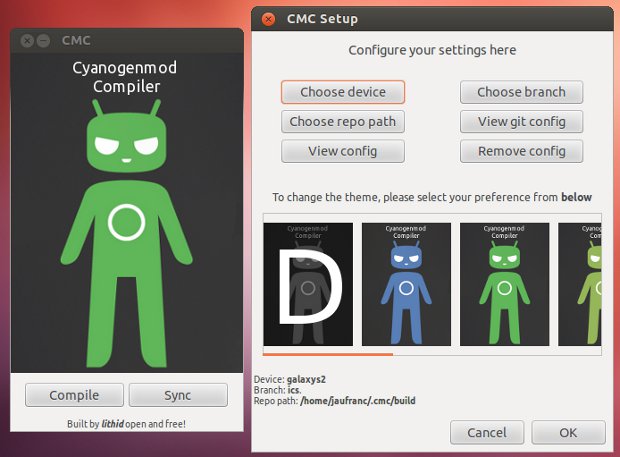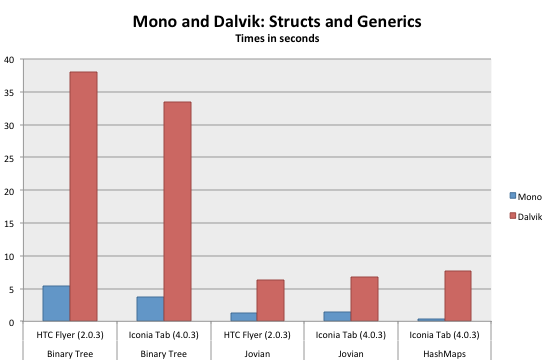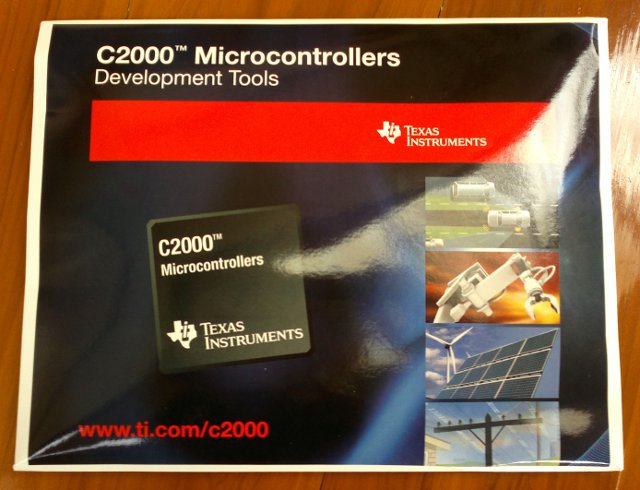I’ve recently upgraded to Ubuntu 12.04 and this is a great operating system. However, if you do some arm development and expect to be able to install cross libraries (armel/armhf) or easily generate an arm rootfs using the tools you’ve been used to, you’ll be disappointed. In Ubuntu 11.10 (Oneiric), I used xapt and dpkg-cross to retrieve armel libraries, but it’s broken for Ubuntu 12.04, at least on my system. I’ve been told to switch to multiarch because this will be how it’s done from now on. But I soon discovered this is work in progress as quite a few packages are not multiarched yet including python. Ubuntu developers also decided to remove rootstock (which makes sense since xapt/dpkg-cross will be deprecated), so if you want to generate a rootfs the “gool ol’” way (which won’t be supported much longer), you’d have to install an Oneric chroot to run rootstock, […]
Build Your Phone Android Distro with CyanogenMod Compiler 0.4 GUI (Cmc-pygtk) for Ubuntu
Lithid, a member of XDA Developers Forum, has recently released the 4th version of a GUI tool (Cmc-pygtk) to build Android for a given smartphone as long as it is supported by CM. The CyanogenMod Compiler is supported by Ubuntu 10.04 32/64-bit and greater, and you can either download a deb file or build it yourself by following the instructions below: Install dependencies:
|
1 2 3 4 |
sudo apt-get install build-essential devscripts ubuntu-dev-tools debhelper \ dh-make diff patch cdbs quilt gnupg fakeroot lintian pbuilder piuparts \ flex bison gperf libsdl1.2-dev libesd0-dev libwxgtk2.6-dev squashfs-tools \ libncurses5-dev zlib1g-dev openjdk-6-jdk pngcrush schedtool |
Clone the source tree:
|
1 |
git clone git://github.com/lithid/Cmc-pygtk.git |
Generate a gpg key:
|
1 |
keygpg --gen-key |
Delete the changelog or dpkg will use lithid key instead.:
|
1 2 |
cd Cmc-pygtk rm os-versions/common/changelog |
Edit the EMAIL field in the Makefile and replace it with the one used to generated the gpg key. Build it for your version of Ubuntu. For Ubuntu 12.04 32-bit:
|
1 |
make cmc-12.04-32 |
And install it:
|
1 2 |
cd out sudo dpkg -i cmc-12.04-32-v0.4.deb |
Before using CyanogenMod Compiler (CMC) is installed, you need to install google repo tool:
|
1 2 3 |
curl https://dl-ssl.google.com/dl/googlesource/git-repo/repo > repo chmod a+x repo sudo mv repo /usr/local/bin/repo |
Now that everything is setup, you can run CyanogenMod Compiler: cmc A disclaimer message telling […]
Detect Mobile Devices with WURFL in Websites and Mobile Apps
When designing a mobile application or webpage, you may want to know exactly to know what devices access your site or run your application for example to differentiate automatically between desktops, laptops, tablets and smartphones and provide a user interface which is appropriate for a given screen size. This can be achieved with WURFL (Wireless Universal Resource FiLe), a Device Description Repository (DDR). This software component maps HTTP Request headers to the profile of the HTTP client (Desktop, Mobile Device, Tablet, etc.) and provides a description of the capability of the device that made the request. WURFL repository is an xml file (wurfl.xml – Direct links to version 2.3.1: wurfl-2.3.1.zip or wurfl-2.3.1.xml.tar) containing the definition of thousand of devices which can be access using the WURFL APIs. Several large Internet companies such as Facebook and Google are using WURFL, and ScientiaMobile, the company behind WURFL, claims that it is the […]
Xamarin Ported Android to C#. Results: Massive Performance Improvements over Dalvik
Xamarin has been providing Mono, a C# framework that can work on Linux for some years, and more recently they have also launched Mono for Android and iOS so that you can write or re-use existing C# application on the most common samrtphone platforms. But their latest project “XobotOS Research Project” goes much further, as they have entirely re-written Android Dalvik engine based on Java with C#. Considering the million of lines of code in Android, they have found a tool to automatize the Java to C# conversion. This tool is an Eclipse plugin called is Sharpen, and Xamarin has made further improvements to Sharpen which are available on Github. They already have ported Android 2.x and Android 4.0 to C#. If you wonder why they would do that, look at the “benchmarks” below showing Mono vs. Dalvik implementation of Android for binary tree, jovian and hashtags. Since the company […]
Texas Instruments F28069 Piccolo controlSTICK Unboxing and Review
I’ve recently received a TI F28069 Piccolo controlSTICK evaluation kit after winning a game organized by Mouser and Texas Instruments on Facebook. I’ll show what’s the content of this C2000 MCU development kit and play around with the development tools provided. Mouser sent the development tools by Fedex which took 6 days to arrive in Thailand, and the package with the development tools looks like the one below. You’ll find the following in the package: F28069 Piccolo controlSTICK USB Cable 6x Jumpers 2x Cables to connect to external hardware CD with Piccolo F28069 controlSTICK development tools Here’s a closer look to the top of Piccolo controlSTICK, with (left to right) the JTAG emulator chip, C2000 MCU (320F28069PNA) and connector… …and the bottom of Piccolo controlSTICK. Now let’s have a look at the content of the CD: The Drivers directory contains the drivers needed for the controlSTICK development kit (also used […]
Building Chromium OS for Raspberry Pi (ARMv6)
I had previously written the instructions to build an older version of Chromium (via Berkelium) for ARM using Beagleboard/Overo rootfs in order to use it with Xibo digital signage. Recently I’ve been contacted by hexxeh, who maintains Chromium OS vanilla builds for x86 and MacOS computer, as he intends to provide Chromium OS for the Raspberry Pi, and you should be able to get a SD card image once everything is working from the site above. Today, I’ll post the steps followed to build Chromium OS LKGR (“the latest revision to pass only unit tests”) optimized for ARMv6 processor with soft-float support, which is the type of processor (Broadcom BCM2835) used in the Raspberry Pi. Please note that although it can build, it still does not run properly and a few more changes are needed. First, you’ll need a fast machine to build Chromium OS in a reasonable amount of […]
Texas Instruments Releases Android 4.0.3 DevKit for Beagleboard-XM and Beaglebone
After collaborating with arowboat, android-porting and Linaro communities, Texas Instruments has released Android 4.0.3 development kits for Sitara microprocessors which support Beagleboard-XM (Sitara DM3730) and Beaglebone (Sitara AM335x) low cost development boards, as well as other Sitara-based evaluation modules and development boards. Android 4.0.3 Devkit for Beaglebone If you have a Beaglebone (and an LCD or DVI-D cape), you can use TI Android ICS 4.0.3 DevKit v3.0.1, a release providing an Android ICS 4.0.3 distribution for TI’s Sitara AM335x ARM Cortex A8 Processors. This DevKit provides Android sources with pre-integrated SGX (3D graphics accelerator) drivers, TI hardware abstraction for Audio, WLAN & Bluetooth for TI WL1271 chipset, USB mass storage, etc, as well as development and debugging tools such as a toolchain, TI CCSv5, ADT plugins and more, which are provided to build custom Android solutions for the embedded market more easily. The pre-built images includes Android default apps, multimedia […]
Nokia Qt Labs Releases Qt 5.0 Alpha
Nokia Qt Labs announced the alpha release of Qt 5 C++ application development framework, which focuses on the delivery of Qt Essential modules for Qt 5. This new version of Qt goal is to bring the focus to a model, although native Qt using C++ would still be used to implement modular backend functionality for Qt Quick. The developers explains that this module is working nicely on Qt for embedded system where UIs are full screen, but more work is needed on the desktop, and it will only be fully implemented in Qt 5.1 or 5.2. Qt developers make 4 big architectural changes to Qt internal architecture: Base all Qt ports on Qt Platform Abstraction layer (QPA) to make it easier to port Qt to other windowing systems and devices. Re-architect Qt graphics stack using a a Scenegraph on top of OpenGL to increase performance versus Qt 4, using Qt […]








